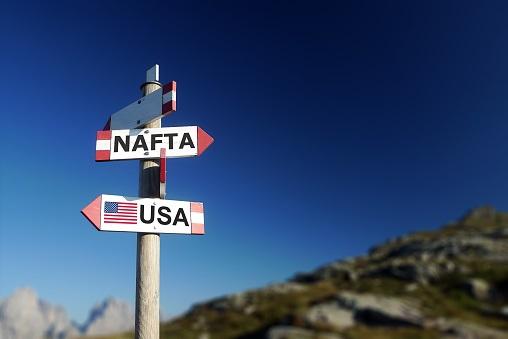Contributing Writer
- FMA
- The Fabricator
- FABTECH
- Canadian Metalworking
Categories
- Additive Manufacturing
- Aluminum Welding
- Arc Welding
- Assembly and Joining
- Automation and Robotics
- Bending and Forming
- Consumables
- Cutting and Weld Prep
- Electric Vehicles
- En Español
- Finishing
- Hydroforming
- Laser Cutting
- Laser Welding
- Machining
- Manufacturing Software
- Materials Handling
- Metals/Materials
- Oxyfuel Cutting
- Plasma Cutting
- Power Tools
- Punching and Other Holemaking
- Roll Forming
- Safety
- Sawing
- Shearing
- Shop Management
- Testing and Measuring
- Tube and Pipe Fabrication
- Tube and Pipe Production
- Waterjet Cutting
Industry Directory
Webcasts
Podcasts
FAB 40
Advertise
Subscribe
Account Login
Search
Manufacturing sectors differ over NAFTA rules of origin
Some want complete rewrite of the requirements, others suggest proceeding with caution
- By Stephen Barlas
- August 14, 2017

With the North American Free Trade Agreement up for renegotiation, just how will the U.S. Trade Representative look to change rules of origin provisions?
Look for some intra-U.S. manufacturing industry fireworks as the North American Free Trade Agreement (NAFTA) renegotiations get underway, as they did in mid-August.
One of the key areas the Trump administration wants to address is “rules of origin,” which allow both Canada and Mexico to block imports of some U.S. manufactured products. These rules of origin provisions also allow Canada and Mexico to use, to an extent, non-NAFTA sources for products exported to the U.S.
During the first six months of the Trump administration, the debate has been about “Buy American.” In particular, the White House has called for publicly funded infrastructure projects in the U.S. to have a high level of U.S.-sourced components. Now the debate is shifting to “Sell American,” which is calling for a closer look at whether Canada and Mexico are using NAFTA rules to block imports of U.S.-manufactured products and cheating on their duty-free exports here, costing U.S. manufacturers sales in this country.
For the most parts, products of all kinds flowing from and to the three countries are not subject to tariffs. What does impact trade across borders, however, are rules of origin. For example, U.S. line pipe manufacturers argue the rules create the potential for Mexican producers of line pipe to use dumped and subsidized imported steel to Mexico to produce line pipe that then can enter the U.S. without any assessment of duties.
The U.S. team charged with NAFTA renegotiating responsibilities seeks to update and strengthen the rules of origin provisions to ensure that the benefits of NAFTA go to products genuinely made in the U.S. and North America. In other words, they want to make it harder for products to travel duty-free within the three countries if too much of the product is sourced outside the three countries.
But there are conflicting views among U.S. manufacturers on whether changes to the rules of origin are advisable. Line pipe manufacturers are all for changes.
Meanwhile, the National Tooling and Machining Association (NTMA) and Precision Metalforming Association (PMA) express some hesitancy. They acknowledge that the rules of origin levels set in the Trans-Pacific Partnership (TPP) Agreement likely contributed to its downfall. They believe that in TPP negotiations, the U.S. acquiesced to levels way below those expected. However, both NTMA and PMA warn that an update of NAFTA should not go too far in the opposite direction, increasing content requirements to counterproductive levels.
AdvaMed, which represents medical equipment manufacturers, is opposed to rules of origin changes in NAFTA. More stringent criteria, coupled with strict application of content requirements, can adversely affect a company’s ability to sell products in the NAFTA markets, according to association officials. Additionally, stricter criteria is also believed to be particularly problematic for companies that source multicomponent products in the NAFTA region.
DOE Rules Affects Steel Sheeting for Walk-in FreezersManufacturers of walk-in cooling freezers will have to comply with new energy-saving requirements in the next few years. That means considerable changes to the insulation they use in those products, and in turn may change the manufacturers’ sheet metal requirements.
To bring products into compliance with standards, the Department of Energy (DOE) expects the industry to incur total conversion costs of $18.7 million. That breaks down to $14 million in product conversion costs for redesign, testing, and labeling and $4.7 million in capital conversion costs, which cover investment in tooling and machinery necessary to update condensing system production equipment for models that do not meet the required efficiency levels.
Some of the larger manufacturers of these products are Traulsen, Lennox, Hussmann, Manitowoc, Rheem, and Emerson. Numerous niche manufacturers will be affected as well.
subscribe now

The Fabricator is North America's leading magazine for the metal forming and fabricating industry. The magazine delivers the news, technical articles, and case histories that enable fabricators to do their jobs more efficiently. The Fabricator has served the industry since 1970.
start your free subscriptionAbout the Author

Stephen Barlas
- Stay connected from anywhere

Easily access valuable industry resources now with full access to the digital edition of The Fabricator.

Easily access valuable industry resources now with full access to the digital edition of The Welder.

Easily access valuable industry resources now with full access to the digital edition of The Tube and Pipe Journal.
- Podcasting
- Podcast:
- The Fabricator Podcast
- Published:
- 04/16/2024
- Running Time:
- 63:29
In this episode of The Fabricator Podcast, Caleb Chamberlain, co-founder and CEO of OSH Cut, discusses his company’s...
- Trending Articles
Tips for creating sheet metal tubes with perforations

Supporting the metal fabricating industry through FMA

JM Steel triples capacity for solar energy projects at Pennsylvania facility

Fabricating favorite childhood memories

Omco Solar opens second Alabama manufacturing facility

- Industry Events
16th Annual Safety Conference
- April 30 - May 1, 2024
- Elgin,
Pipe and Tube Conference
- May 21 - 22, 2024
- Omaha, NE
World-Class Roll Forming Workshop
- June 5 - 6, 2024
- Louisville, KY
Advanced Laser Application Workshop
- June 25 - 27, 2024
- Novi, MI


























